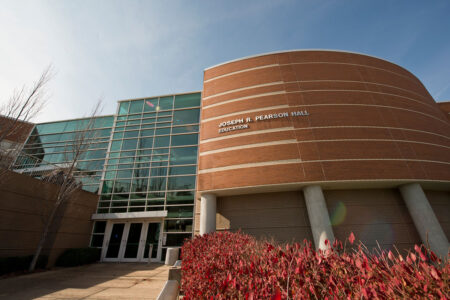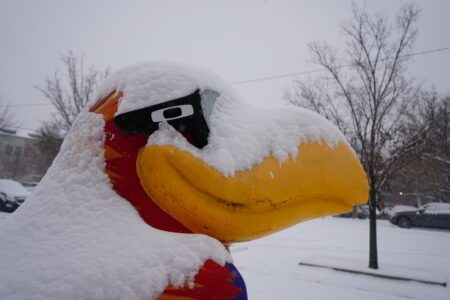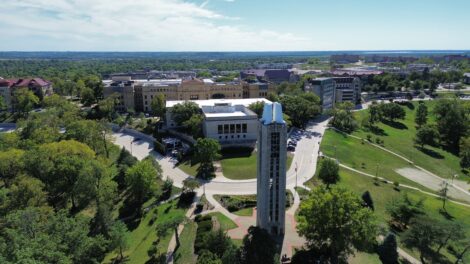Despite increased state funding, KU and other state universities propose tuition hikes

photo by: Shutterstock Photo
University of Kansas campus
TOPEKA – Despite legislators’ recent approval of a multimillion-dollar increase in higher education funding, most of Kansas’ state universities, including the University of Kansas, want to hike tuition and fees for the 2019-2020 school year.
During the Kansas Board of Regents’ meeting on Wednesday, Matt Casey, director of government relations for the Regents, said that the Legislature approved the $28.4 million increase in general state funding for universities in hopes that schools would keep their tuition rates flat. Pittsburg State University and Fort Hays State University did propose flat rates for undergraduate tuition on Wednesday, but the other four universities proposed increases.
Under KU’s proposal, tuition for all in-state students at the Lawrence campus would increase by 1%, and tuition for all out-of-state students would increase by 2.5%.
KU Chancellor Douglas Girod said the tuition increases were necessary because university costs have risen in the last 10 years while state funding has mostly stagnated. He told the Regents he appreciates the increase in state funding, but more will need to be done before KU’s tuition rates can start to fall.
“We’re on the right path, but we’re not there yet,” Girod said.
The increases at KU’s Lawrence campus would amount to $49.50 per semester for in-state undergraduates and $328.50 for out-of-state undergraduates. In total, a semester of in-state undergraduate tuition would cost $5,095.50, and a semester of out-of-state undergraduate tuition would be $13,479.75. In-state graduate students would pay $49.80 more per semester, for a total of $5,044.20, and out-of-state graduate students would pay $292.20 more per semester, for a total of $11,975.40.
At KU’s other campuses, the plan looks a bit different. KU proposed lowering tuition for in-state undergraduates by 1.7%, a decrease of $100.50, at its Edwards Campus in Overland Park, for a total cost of $5,703.75 per semester. However, the university proposed a 1.3% increase, or $178.50, for out-of-state undergraduates at the Edwards Campus, for a total cost of $14,088 per semester. For its medical school, the university offered to keep all tuition rates flat.
In total, KU estimates the tuition and fee increases will generate about $4.4 million of additional revenue, according to Regents documents.
The proposed rate increases at other universities include a 3.1% increase at Kansas State University, a 2.5% increase at Emporia State University and a 1% increase at Wichita State University.
• • •
Although some of the Regents supported tuition increases, they also expressed concerns that the universities’ proposals would be a surprise to state lawmakers.
Regent Allen Schmidt said he worried the tuition hikes might feel like “an ambush” for lawmakers. He said the Regents and university leaders need to reach out to lawmakers supporting higher education to explain the reasons for the increases to make sure the decision doesn’t hurt state funding in the future.
“We need to protect next year’s dollars also,” Schmidt said.
Girod said he agreed, but he noted the suggestion of keeping flat tuition was based on the Regents’ original request to the Legislature for an $85 million increase in state funding over the next two years — $50 million this year and $35 million the next.
Regent Ann Brandau-Murguia, who has been a vocal proponent of lowering tuition in recent years, said she believed the Regents made an unwritten agreement with lawmakers that if state funding increased, the universities would keep tuition rates flat. She said she did not support any tuition rate increases this year.
However, Regent Dave Murfin, who said he generally supported the increases, asked the board to keep things in perspective. He noted that only two of the universities are proposing tuition hikes of more than 1% for in-state students.
“I think they’ve done a tremendous job listening to the Legislature,” Murfin said of the universities.
Chair Dennis Mullin said he’s not sure how he will vote on the proposals in a month. He said he believes higher education is important to the state’s future and he plans to reach out to state lawmakers to explain why the universities still need additional funds.
But he asked the universities to again consider amending their proposals to keep tuition flat before the Regents vote on final approval in June.
“I appreciate everything that you guys have done to try to keep this at a minimum,” Mullin told the university leaders. “I ask you to revise wherever possible.”
In addition to the $28.4 million increase of general state funds, the budget that legislators passed earlier this month includes $4 million that will go toward K-State’s Global Food Systems program. Gov. Laura Kelly has not yet signed the budget bill into law.
• • •
In other business, the Regents:
• Approved KU’s request to renovate the lower level of the Burge Union to construct the Student Engagement Center, which will include office space, collaboration lounges and an e-sports recreational commons area. The project is expected to cost $950,000 and will be funded by the KU Memorial Union Corporation.
• Approved KU’s request to replace air handling units in Haworth Hall. The current air handling units are failing and require replacement, according to the university. The project is expected to cost $950,000 and will be funded through the university’s education building fund.
• Approved KU’s request to create four new bachelor’s degree programs: ecology, evolution, and organismal biology; molecular, cellular and developmental biology; leadership in diversity and inclusion; and American sign language and deaf studies.
• Gave final approval to a five-year capital improvement plan, which includes setting a series of dates for the $300 million worth of renovations to KU’s David Booth Kansas Memorial Stadium and a one-time $20 million renovation to Allen Fieldhouse.
Contact Dylan Lysen
Have a story idea, news or information to share? Contact University of Kansas, higher education, state government reporter Dylan Lysen:
- • dlysen@ljworld.com
- • 785-832-6353
- • Twitter: @DylanLysen
- • Read other stories by Dylan







